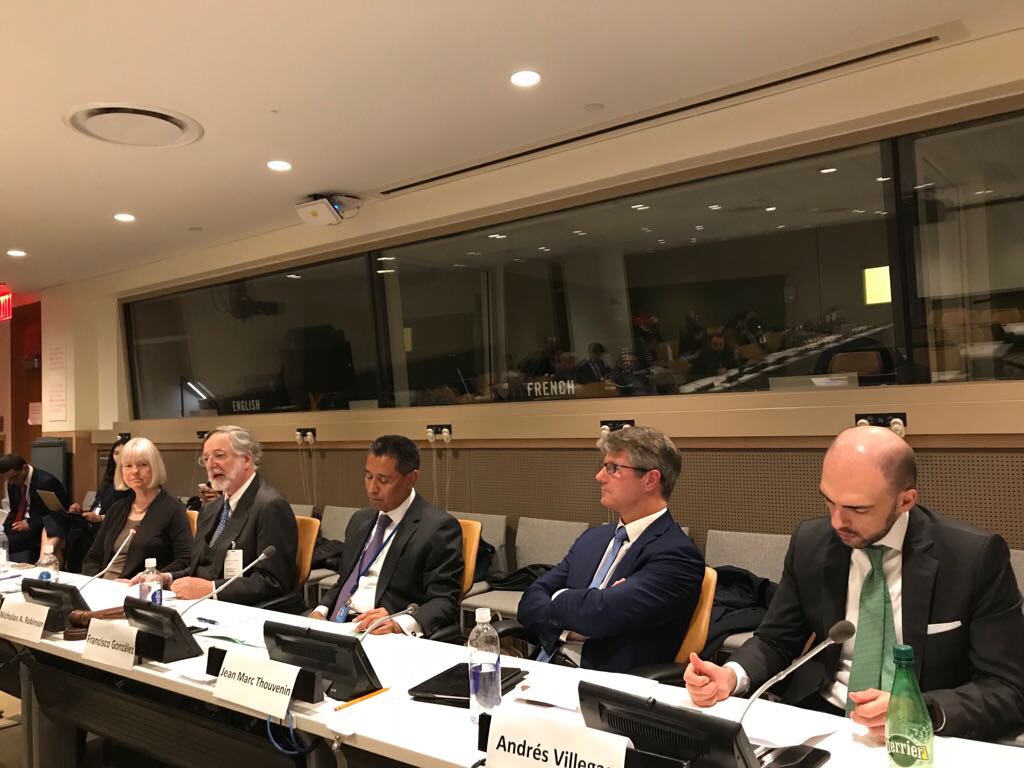The Environment and Human Rights: A New Perspective from the Inter-American Court of Human Rights
A side event in observance of World Environment Day was hosted by the Permanent Mission of Colombia to the United Nations on 4 June 2018 as a panel discussion on the historic Advisory Opinion of the Inter-American Court of Human Rights on "human rights and the environment."
On the occasion of World Environment Day, the Permanent Mission of Colombia to the United Nations organized a side event in the form of a Panel of Experts concentrated on the contents, scope, and the potential effects of the Advisory Opinion issued by the Inter-American Court of Human Rights on 15 November 2017 on "The Environment and Human Rights" (OC-23/17), in response to a request presented by the Government of Colombia.
Panel Discussion
During the side event, the panelists addressed three main topics:
(1) What Colombia requested from the Court;
(2) The response given by the Court, and the contents and scope of the decision; and
(3) An assessment of the implications of the Advisory Opinion for the protection of the environment and its link with human rights.
- Andrés Villegas, from the Ministry of Foreign Affairs of Colombia, explained the motivations behind Colombia appearing before the Inter-American Court, including concern for the protection of the marine environment in the Caribbean Sea for present and future generations, as well as the human rights of the communities living in the region.
- Professor Jean-Marc Thouvenin, Secretary-General of The Hague Academy for International Law, summarized the Court’s reasoning and its decision, explained why this decision was important for Colombia, and described how it advanced human rights and international environmental law.
- Professor Stephanie Farrior, Director of the Center for Applied Human Rights at Vermont Law School, made an assessment on the decision, explained that she saw it as a groundbreaking decision paving the way or further developments in international human rights law, and analyzed how it advanced extraterritorial obligations with regard to human rights treaties.
- Professor Nicholas A. Robinson, Executive Governor of the International Council of Environmental Law and WCEL Chair Emeritus, closed with an assessment of the important implications of the decision. He opined that this Advisory Opinion's recognition of the autonomous right to the environment reflects comparable decisions across all Earth's regions; finding that the state obligation to protect the environments is now a norm erga omnes in international law (For a text of the address, see "Downloads" section of this website).
Background
The Inter-American Court of Human Rights is the international tribunal of the Inter-American System of Human Rights. It was established by the 1969 American Convention on Human Rights and has been delivering judgments, advisory opinions and orders since 1982. A Special feature of this Court is that it is endowed with a wide jurisdiction on advisory matters. Unlike other international tribunals, the States Parties to the American Convention are themselves entitled to activate this jurisdiction, via requests for advisory opinions.
On 14 March 2016, the Republic of Colombia availed itself of this possibility and addressed to the Court a request concerning State obligations in relation to the environment in the context of the protection and guarantee of the rights to life and personal integrity – recognized in Articles 4 and 5 of the American Convention on Human Rights – with regard to Articles 1(1) and 2 of said treaty.The proceedings took place between May 2016 and March 2017. In addition to Colombia, as requesting State, four States parties made representations before the Court. WCEL joined the more than 47 written submissions made by state agencies, national and international organizations, academic institutions, non-governmental organizations, and individuals. Furthermore, the joint submission of the Commission and the Organization of American States was presented alongside 32 oral arguments during publichearings the 57th special session of the Court on 22 March 2017.
The Advisory Opinion spawned many positive responses from academia and practitioners, who have seen it as a historical and groundbreaking decision with regard to the connection between human rights and the environment. It has even been perceived by some as the most significant decision yet by an international judicial body in fully acknowledging certain legal consequences for transboundary environmental harm. In issuing its Advisory Opinion, the Court has construed Article 26 of the American Convention on Human Rights, also known as the Pact of San José, to reflect the progressive development of the socio-economic and cultural rights in the human rights context to now incorporate the obligation of States to protect the environment. The Court has also recognized that there is an autonomous right to the environment, and that human rights and the substantive and procedural environmental rights are intertwined with human rights. The Court further interprets the jurisdiction of States to extend beyond a State's territory to all activities under its effective control, and observes that environmental procedural duties, such as the use of Environmental Impact Assessment (EIA) is a State obligation under the right to the environment.





